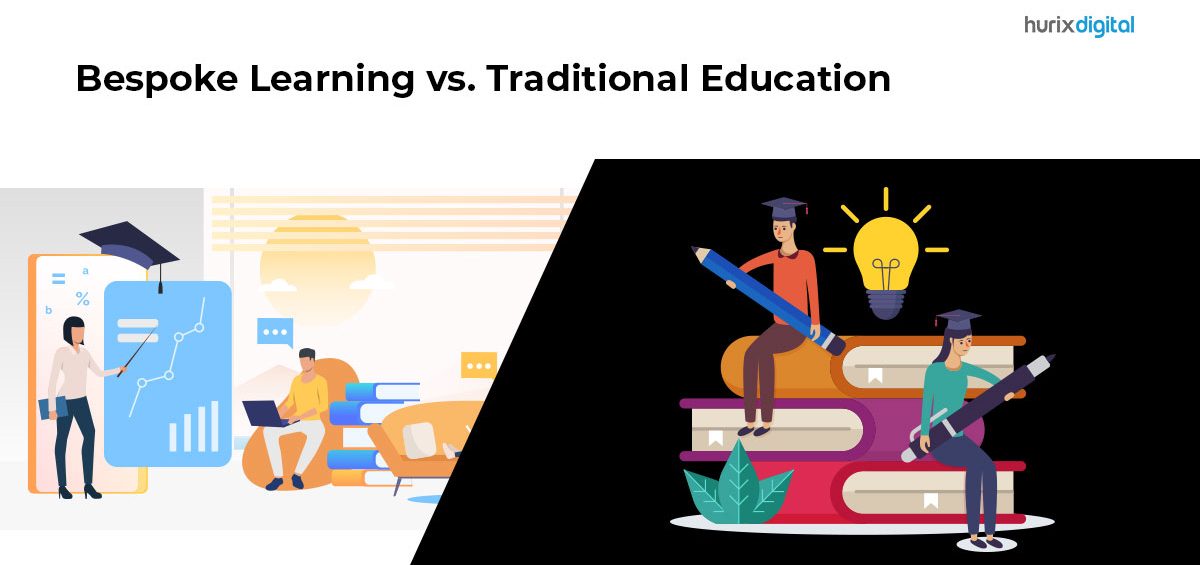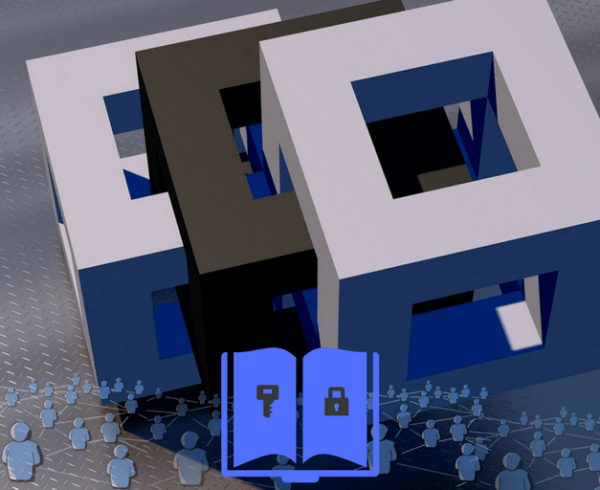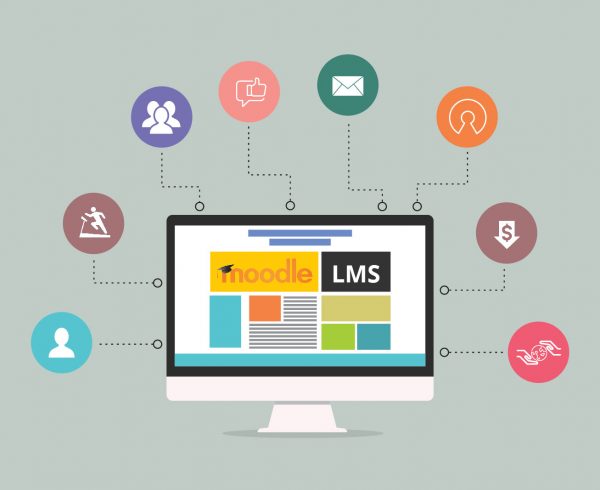Summary
This blog has provided a brief overview of bespoke digital learning and its differences from traditional education.
The education industry has evolved to meet the demands of the new learning environment ever since the Covid pandemic. Conventional learning methods proved outdated and ineffective during this time. In response, new educational approaches, such as online learning, competency-based learning, etc., have emerged to overcome the limitations presented by traditional classrooms.
There has been an increase in demand for online education, with the online education market slated to grow at an annual rate of 9.48% until 2027. Another interesting trend is the emergence of bespoke digital learning, which is set to change the future of the education industry.
This blog will delve into bespoke eLearning, how it differs from traditional education, and how it benefits learners and educators.
Table of Contents:
- What is Bespoke Learning?
- What is Traditional Education?
- Differences Between Bespoke Learning and Traditional Education
- Benefits of Bespoke Learning for Educators
- The End Note
What is Bespoke Learning?
Bespoke learning is a modern educational approach that focuses on personalizing learning content. Bespoke online learning caters to the unique needs of learners in schools and universities, making their learning experience customized and relevant.
What is Traditional Education?
Traditional education focuses on delivering an off-the-shelf kind of learning experience. In this conventional educational setting, students sit in a classroom while a teacher delivers the lecture. The lecture follows a standard syllabus determined by a preset curriculum without any consideration for the unique learning needs of students.
Differences Between Bespoke Learning and Traditional Education
Bespoke digital learning and traditional education differ from each other in many ways. Let’s explore each one so you can gain a better understanding of their differences.
1. Curriculum Design
In traditional education, the curriculum follows a standardized design established by educational authorities. This design covers various subjects to foster well-rounded academic development for students.
On the other hand, with bespoke eLearning, a great degree of flexibility is present in the curriculum design. The curriculum design allows for individual learning needs and preferences, enabling students to explore and delve deeper into subjects that they find interesting.
2. The Teacher’s Role
In traditional education, the teacher assumes a key role and imparts knowledge to the students, who act as passive learners. In this case, the interaction between the teachers and students is limited.
While in the case of bespoke learning, the teacher acts as a facilitator for students, who play an active role in the learning process. With teaching approaches like collaborative learning and group learning consisting of discussions and projects, a great degree of interaction exists among the students and between the teacher and students.
3. Degree of Personalization
Traditional education follows a one-size-fits-all learning approach, with the same syllabus, textbooks, and teaching methods for students. As a result, there is a very limited to zero degree of personalization in this conventional form of education.
Conversely, bespoke learning incorporates personalized learning. It considers students’ interests, strengths, and learning needs and allows them to study independently on their preferred devices.
Students have varying learning styles: visual learners, auditory, and kinesthetic. Bespoke learning allows different learners to flourish by incorporating videos, audio, animated storytelling, and other multimedia elements to ensure no student feels neglected.
4. Integration of eLearning Elements
With traditional education, integrating eLearning elements is limited to PowerPoint presentations and documentaries.
In contrast, eLearning elements are expansively integrated with bespoke digital learning. It uses ebooks, game-based learning, and scenario-based learning to provide an engaging educational experience to students. In addition, bespoke learning uses micro-learning to deliver content, boosting students’ knowledge retention.
5. Assessment Styles
Traditional education follows a summative assessment format. The assessments occur at set times in a classroom setting and measure what the students have learned up to a certain point.
On the other hand, bespoke learning follows an interactive form of assessment. After completing a chapter unit, students can be evaluated through quizzes, case studies, etc. They can also visit and revisit the chapter modules and online tests as often as needed. Along with being convenient, the interaction with chapter content through engaging assessments improves comprehension and increases retention.
Since bespoke learning provides flexibility to students for taking assessments, unlike traditional education, there is no set time and place.
Also Read: What is Online Assessment: Exploring the Future of Online Assessments
6. Skill Development
In traditional education, students must memorize theories and formulas to pass their exams. While this instills in-depth theoretical knowledge about different subjects, conventional learning fails to foster the development of important practical skills.
Unlike this, bespoke eLearning content equips students with the ability to apply their knowledge of subject matters to real-life problems. By encouraging discussions and critical questioning, bespoke learning develops and enhances essential skills like critical and creative thinking, problem-solving, and more.
7. The Role of Technology
Unlike traditional learning, where the role of technology is minimal, technology is integral to bespoke digital learning. Automating grading assessments and related feedback enables students to quickly gain insights into their subject-related strengths and weaknesses.
Technologies like AI gather data and generate analytical reports about students’ performance, enabling teachers to modify their curriculum accordingly. AR and VR technology enable students to understand subject matter realistically in simulated environments and provide an immersive learning experience.
Benefits of Bespoke Learning for Educators
Bespoke learning improves the capability of educators to provide a better quality of education to students. Apart from this, there are various indirect benefits of bespoke learning:
- It helps educators foster an in-depth understanding of the subject matter among students.
- It allows them to explore new instructional strategies.
- It enables them to instill curiosity and a love for learning in students.
- It allows them to invest their free time (resulting from a reduced workload) in other important activities, like developing a strong connection with students.
- It enables educators to cultivate a learning environment where students thrive, thus enhancing their job satisfaction.
Also Read: 10 Trends in Education Technology That Will Have A Major Impact in 2023
The End Note
There is a significant difference between traditional and bespoke eLearning. Namely, the vast benefits of tailored learning programs. The global eLearning industry is projected to grow to $465 billion by 2028, marking this shift in education strategies.
If you want to capitalize on this and improve learning outcomes, consider outsourcing bespoke eLearning solutions from companies like Hurix.
Hurix Digital offers custom content solutions to meet the learning needs of students in your educational institution. We provide eLearning elements like game-based, micro-learning, mobile learning, and more to help you deliver a rich and engaging learning experience.
As a firm believer in improving learning outcomes, Hurix is the trusted preference of companies like Wiley, McGraw Hill, Cambridge University Press, and more. To know more about bespoke learning solutions, contact Hurix Digital.











